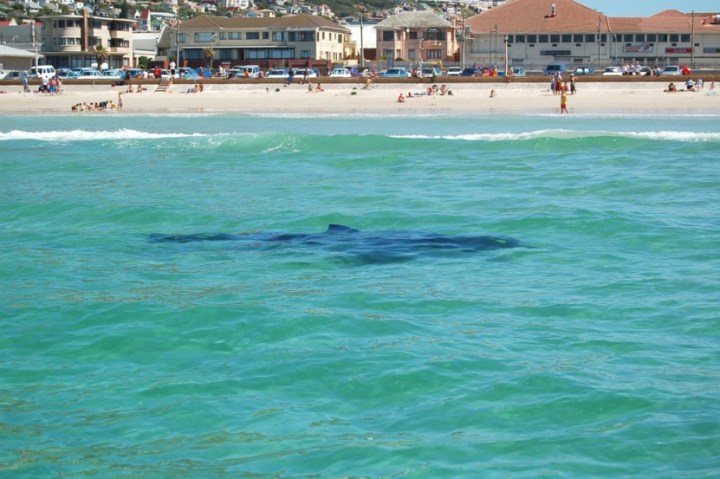DM168 Science
Shark deterrent device may cut attacks by 60%

There are a number of personal electronic deterrents already on the market, and they have become small enough to fit on to scuba tanks, surfboards or attached to bodies.
First published in the Daily Maverick 168 weekly newspaper.
A device the size of a cellphone could stop one of humankind’s most feared predators from taking a bite out of surfers, divers and swimmers.
The device is a personal electronic deterrent and new research, published by Australia’s Royal Society Open Science journal, shows it is 60% successful in preventing shark attacks.
It works by emitting a strong electric field that interferes with the shark’s electro-receptive system, which the predator uses to find prey. The shark only feels this electric field when it is up close and is about to bite.
“This is kind of like chilli sauce that disrupts the attempt to bite,” explains Professor Corey Bradshaw of Flinders University, in Australia.
Bradshaw and his team have worked out that the use of such gadgets could, over the next 50 years, prevent as many as 1,063 Australians from being attacked by sharks.
The scientists developed models using population growth statistics as well as data on shark attacks from the past 120 years. From 1900 to 2020, the Australian Shark Attack File recorded 985 shark-related incidents from 20 species.
They coupled the research with tests on the three species mainly responsible for attacks in Australia – the white shark, the bull shark and blacktip reef sharks. From this, they were able to estimate the preventative impact electronic deterrents would have in the future.
“In Australia, most shark fatalities are from leg bites and people bleeding out before they get to shore,” says Bradshaw. “Interestingly, if you are bitten on the arm or the torso, you are less likely to die.”
There are a number of personal electronic deterrents already on the market, and they have become small enough to fit on to scuba tanks, surfboards or attached to bodies.
In Australia, the cost of the safety devices is subsidised by the government and they are used widely. In South Africa, however, a reputable brand can cost as much as R7,000. There are also brands out there that, the experts say, don’t work as well.
“The problem is that there are a lot of snake-oil salesmen out there saying this will prevent shark bite, with very little research behind it,” says Sarah Waries, the CEO of Shark Spotters, a conservation group based in Cape Town.
In South Africa, Waries says, shark deterrents are usually beach-wide initiatives such as the use of shark nets or “spotters” on cliffs, who provide an early-warning system against the predators.
The problem with shark nets, which have been in use for close on 90 years, is that they kill large numbers of sharks.
An alternative control measure are drumlines, unmanned aquatic traps used to lure and capture large sharks using baited hooks. So-called smart drumlines do, however, allow for sharks to be moved unharmed.
There are other more shark-friendly technologies that are being tested. One of these uses an electronic cable stretched across the seabed. It works in a similar way to the personal deterrents in that it scrambles the shark’s electro-receptive system.
Generally, South Africa has fewer shark attacks than Australia, something that still puzzles Geremy Cliff, a former division head at the KwaZulu-Natal Sharks Board.
“South Africa has had far fewer shark attacks, even though it has a similar climate to Australia, the geological arrangement is very similar, the species involved are similar and the water temperatures are similar,” says Cliff, who is now retired.
There have, however, been times when South Africa has experienced spikes in shark bites – a phenomenon that, up until now, was unexplained.
Cliff was once called to investigate a series of attacks off Port St Johns in the Eastern Cape. Between 2007 and 2014, there were seven fatalities. It was suggested that the attacks were the work of a single bull shark that was using the Umzimvubu River as a nursery.
“We looked at some injuries and there were at least two cases where there was a small shark involved as well as a much larger shark. Then the problem suddenly just went away,” Cliff says.
Shark attacks may be rare, but the effect and trauma they have on communities is often long-lasting.
“We saw it in Cape Town and Fish Hoek when there were a couple of shark bites not that far apart from each other,” says Waries. “The community didn’t want to go to the beach and lifesavers couldn’t get people to sign up to join lifesaving training.”
In the future, it may not be just personal electronic deterrents that protect those wishing to enter shark-infested waters.
Flinders University is testing new wetsuit material that resists shark bites. It is not injurry-proof as the wearer could still have their arm crushed, but there would be less of a chance of piecing wounds and, along with that, bleeding.
The use of new technologies is there not only to save human lives. “My perspective is more from the side of the conservation of sharks. If you can get rid of the drumlines and the shark nets, we can have our sharks and be safe from them too,” says Bradshaw.
The chances of being bitten by a shark are very low – there is less than one attack per million people per year, even in regions with relatively high incidence rates, an AFP report on the Flinders study said. DM168
This story first appeared in our weekly Daily Maverick 168 newspaper which is available for free to Pick n Pay Smart Shoppers at these Pick n Pay stores.





















 Become an Insider
Become an Insider
Comments - Please login in order to comment.